Events
from TUESDAY, 11 to SATURDAY, 15 DECEMBER
Shelves Project at Villa Vassilieff
Villa Vassilieff invites Lia Rochas-Pàris and Parties Prises to invest the space of its bookshelves for a Christmas Pop-Up Store. During five days, you will be able to discover Shelves project with the possibility to buy artists works from 5 to 500 euros.
Opening on Tuesday 11, December from 6pm to 9pm
Creations of: Alix Delmas, Annabelle Jouot, Célia Nkala, Emmanuelle Roule, Emile Degorce-Dumas, Judith Prigent, Katia Kameli, Léo Dorfner, Lemégot éditions, Lia Rochas-Pàris, Marine Jezequel, Margaux Dereume, Nikita Garrido, Parties Prises éditions, Patrick Frey éditions, Dorothée Marot, Profane, Quentin Lefranc, Sandra Berrebi, Seem Soap, Sémiose éditions, Stéphane Ruchaud, We Do Not Work Alone
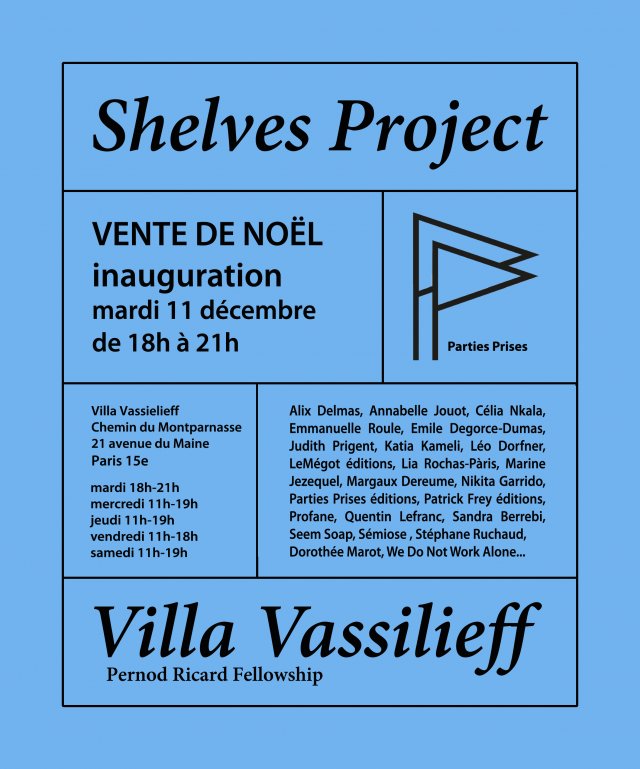
Shelves exhibition is an exhibition space restricted to a daily platform:
a basic shelf resting on squares.
In this perspective, Shelves questions the importance of exhibition space in the valuation of works as much as the creative process and the relationship to intimacy. Since 2015, Shelves gives "carte blanche" to artists to exhibit inspirational objects. Since 2017, Shelves presents collective exhibitions orchestrated by Lia Rochas-Pàris.
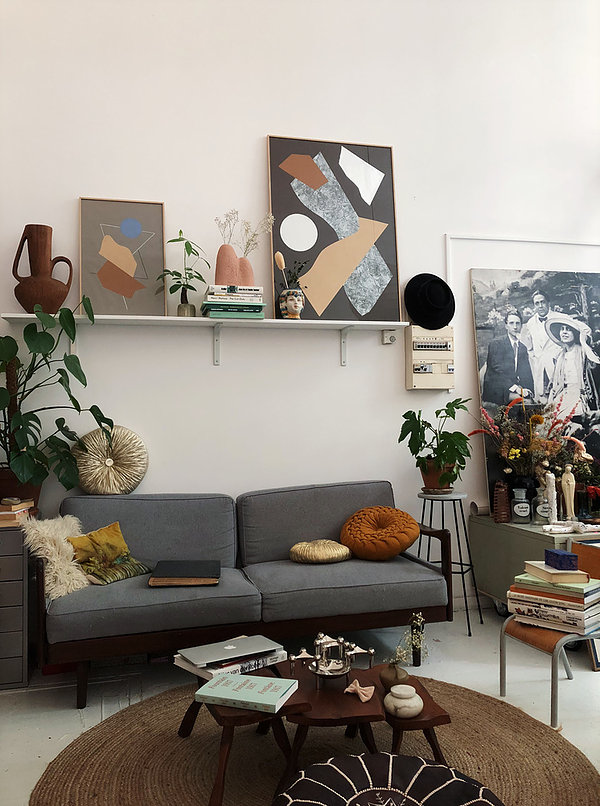
Founded in 2013 by Lia Rochas-Pàris, Parties Prises presents itself as a laboratory of ideas, a creative studio, a publishing house and a consulting agency.
Rich with a network of creative people and multiple collaborations, Parties Prises puts its expertise in Story Telling, artistic direction and digital communication at the service of institutions, companies and brands by promoting a panoramic vision of a changing era perpetual.
Through collective exhibitions such as Shelves exhibitions, workshops - workshops, round tables - talks - and print and multiple editions of artists, Parties Prises offers tools of reflection allowing to define contemporary issues that are part of a creative process to the production of content with a real bias.
THURSDAY DECEMBER 13, 7:00 PM
Céline Gillain - Live
Drama DJ’s
Invited by Mélanie Matranga, Céline Gillain will perform a live at Villa Vassilieff.
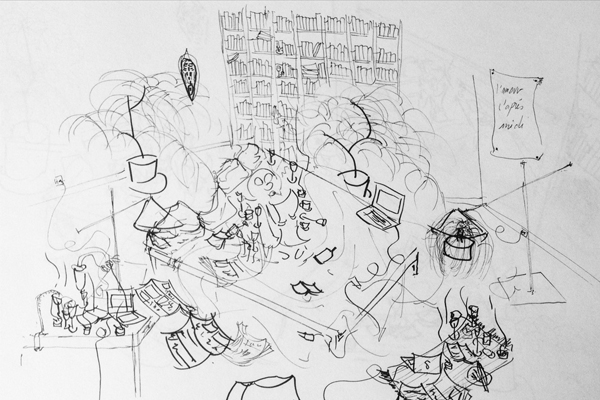
credits: Mélanie Matranga
Céline Gillain is an experimental artist living in Brussels. Her work is a hybrid combination of corrupted pop songs, feminist sci-fi, dark humour, story telling.
Her first album ‘Bad Woman’ is out on Parisian new record label Drama on December the 12th of 2018.
PAST EVENT
SATURDAY SEPTEMBER 29, 3:30 PM
Launch of the book Sophie Podolski, The Country Where Everything is Permitted and conversation between Caroline Dumalin (editor and curator, WIELS, Brussels) and Salome Schmuki (graphic designer).
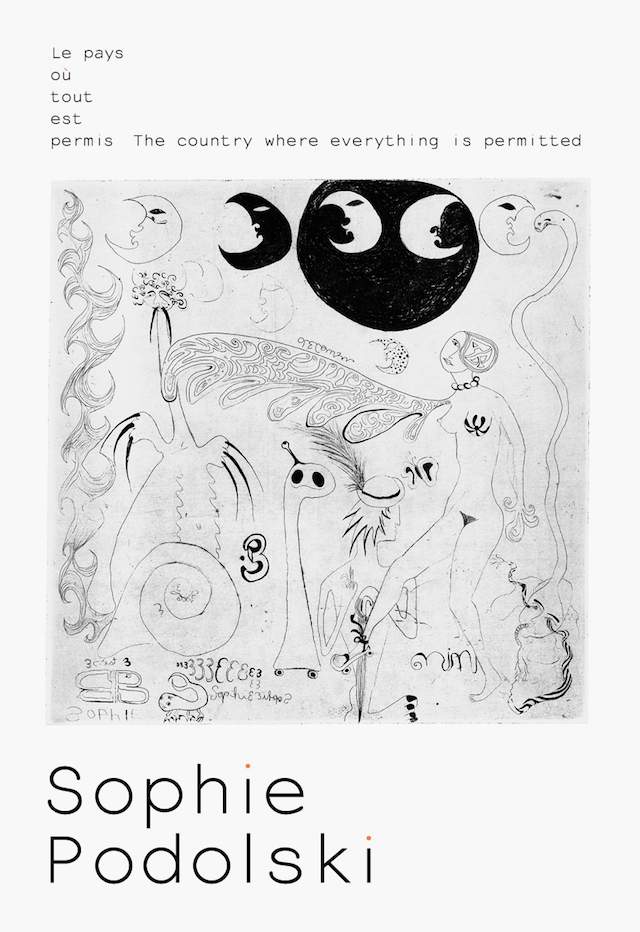
- Cover, Sophie Podolski, The country where everything is permitted / Le pays où tout est permis, WIELS, Mercatorfonds, 2018
Two months after the exhibition Sophie Podolski : The Country Where Everything is Permitted, the Villa Vassilieff is delighted to meet the work of the artist again at the time of the launch of the eponymous edition published by WIELS in Brussels.
Sophie Podolski (1953-1974) was an artist and poetess who produced a remarkable body of graphic work during her brief yet tumultuous life. The exhibition presents a selection of her drawings and the original manuscript of her book The Country Where Everything Is Permitted (1972), emblematic of a time marked by sexual liberation, antipsychiatry and youth disenchantment in the wake of May ’68. She wrote in an expressive, provocative and uninhibited style about her personal life, popular culture and conformist society, which raised the interest of the Parisian literary avant-garde. Her visionary language, in which writing and drawing were inextricably intertwined, made her the unique voice of a counterculture that celebrated experimentation, imagination and the exploration of consciousness. The WIELS then the Villa Vassilieff welcomed this work never integrated into the world and the history of art until now to give it to see in the light of our present, while leaving its characteristic unseizability.
This is the first major publication about the work of Belgian poet and artist Sophie Podolski (1953–1974), who has lingered in obscurity since her untimely death. It features a generous selection of previously unpublished drawings and texts, as well as explorations of Podolski’s personal mythology and of her place in the counterculture of the late 1960s and early 1970s by authors Jean-Philippe Convert, Caroline Dumalin, Chris Kraus, Lars Bang Larsen, and Erik Thys.
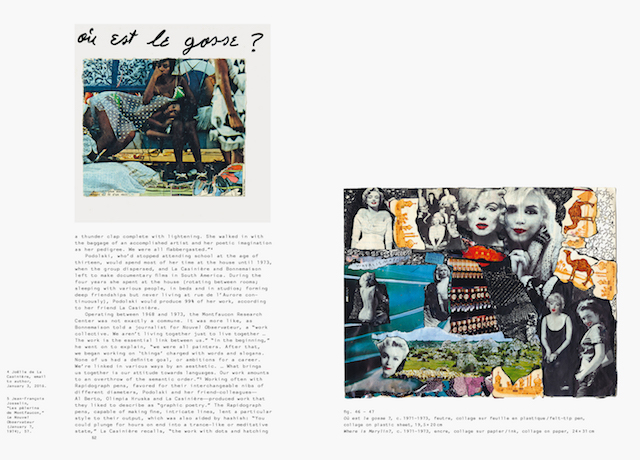
- Pages 52-53, Sophie Podolski, The country where everything is permitted / Le pays où tout est permis, WIELS, Mercatorfonds, 2018
On this occasion, the edition will be available for sale at a price of 25 euros.
Softcover, 18.8 x 27 cm, 144 pages
Published by: WIELS and Mercatorfonds
Edited by: Caroline Dumalin
Designed by: Salome Schmuki
Languages: French/English
Print run: 1,500
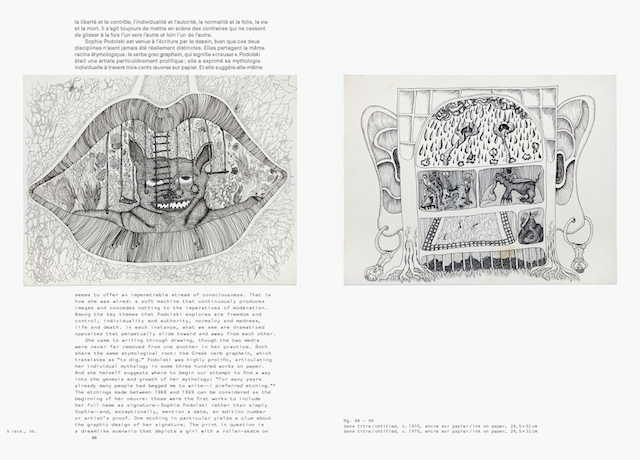
- Pages 86-87, Sophie Podolski, The country where everything is permitted / Le pays où tout est permis, WIELS, Mercatorfonds, 2018
Caroline Dumalin is a curator at WIELS Contemporary Art Centre in Brussels, where she curated, among other things, the solo exhibitions of artists Vincent Meessen, Sophie Podolski, and Hana Miletić.
Salome Schmuki is a graphic designer living and working in Brussels and St. Gallen Switzerland. She studied at the Hochschule der Künste in Zurich, CH, and the Gerrit Rietveld Akademie in Amsterdam, NL. Following her studies, Schmuki was a Researcher in the design department at the Van Eyck, Maastricht, NL, from 2007–8. She has been working on own self initiated projects connected to language and dyslexia. In 2013, Schmuki won the Prix Fernand Baudin for her book Dyslexia – chunking along a straight line – at the crossing turn left (Van Eyck, NL, 2013). She has designed many artists books, and in 2014 received the Most Beautiful Swiss Book prize for Ear Lights, Eye Sounds by Andy Guhl (Edizione Periferia, CH, 2014). Selected exhibitions include Kunstmuseum St. Gallen, CH, Mukha Antwerpen, BE, and Fundació Antoni Tàpies, ES.
FRIDAY OCTOBER 5, 6:30 PM
At the invitation of Mélanie Matranga, Marie Canet presents her last publication, Juntos en la Sierra, Speech Act, identité et globalisation at the Villa Vassilieff - Pernord Rucard Fellowship. On the occasion of this event, two videos of A.M Baggs and Martha Rosler, linked with the author’s research, will be shown in the exhibition space. After the screenings, Mélanie Matranga will put some music on and the conversation will continue over a drink.
Marie Canet, Juntos en la sierra, Speech Act, identité et globalisation at the Shelter Press Editions
This essay offers to think the way beings up to then deprived from representation tools seized visualizing technologies to produce protest and solidary statements. The contextual issue of those hackings is the production of alternative and solidary knoweldge developed from the linguistic, sexual, biologic and geographic margins of history.
Marie Canet is critic and curator. She collaborated with institutions as the Musée d’Art et d’Histoire du Judaïsme (Paris), Flat Time House (London), the Credac (Ivry), the Frac Aquitaine (Bordeaux), the Tate Modern (London) or the Centre Pompidou (Paris)... She is a member of CaroSposo, a collective specialized in cinema and performance. She teaches aesthetics at the Ecole des Beaux-Arts de Lyon and holds a theorical seminar at the Arts Décoratifs in Paris. She is currently working on the writing of a monograh dedicated to Eliane Radigue’s work, and another about Marc Camille Chaimovicz’s work.
Projections :
A.M Baggs, In My Language (2007, 8:37min)
Martha Rosler, How Do We Know What Home Looks Like? (1993, 31:18 min)
A.M Baggs, In My Language (2007, 8:37min) :
Posted in 2007 on the Youtube platform by the activist A.M Baggs, In my Language is both a video and a manifesto that opens concretly the question of identitary attachments and marginal linguistic practices, in the trans-spaces of globalisation. A.M Baggs, as an autistic person, campaings for the consideration of subaltern outlooks and the practising of different knowledges. The movie, shot in the familiar setting of a home, allows A.M Baggs to developp a contextual and environmental way of communicating that goes through the direct contact with the materialities that surrounds it. She sings, makes the house sing as well as the objects around it.
Martha Rosler, How Do We Know What Home Looks Like ? (1993, 31:18 min) :
Made in 1992 by American artist Martha Rosler, How Do We Know What Home Looks Like ? is shot in Firminy in the French department of la Loire at the occasion of the exhibition "Projet Unité", held the same year by Swiss artist Christian Philipp Müller and curator Yves Aupetitallot. The subject of this movie is an "Unité d’habitation" (Housing Unit) by Le Corbusier that was opened in 1967, seven years after the death of the architect. Built at first to adress the needs of the constantly increasing population, this Unit will eventually only be partically occupied, which leads to the closing of the North wing in the 1980’s. Secluded of the city center, "L’Unité d’Habitation" of the Corbusier is inhabited by frail populations (single mothers, students, immigrants, eldery people). In her movie, through visitis and meetings, Martha Rosler brings face to face the Corbusean ideal and the reality of the social and domestic life in the area. Taking place in the middle of the social turning point of art, this artwork by Martha Rosler contributes to an exhibition type which will be defined in 1993 by Claire Bishop as "site-specific".
For this occasion, Marie Canet’s book will be available for sale at the cost of 12 euros.
Marie Canet, Juntos en la sierra, Speech Act, identité et globalisation
Shelter Press, 2018, French edition
Soft-cover, perfect binding
14 x 21 cm, 80 pages
Text : Marie Canet
Illustration : Albane Duvillier
Graphic design : Bartolomé Sanson
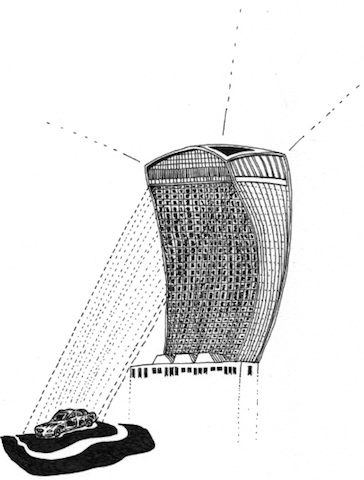
- Albane Duvillier, 2018
SATURDAY NOVEMBER 24, 4:00 PM
Les Siestes électroniques at Villa Vassilieff #2
Les Siestes and la Villa Vassilieff-Pernod Ricard Fellowship present :
Playlist for a Parisian art center vol. 02 by Orange Milk Records
While we spend most of our time listening to "individualized" playlists depending on our "moods", how can we propose a playlist adapted to a collective listening within a contemporary art exhibition ?
Niether a background music, nor a sound design, and not a performative event, the playlist exercise wants to be a semi-domestic experience of listening, that seems fitting to the intimate context of the Villa Vassilieff.
To put together this original playslist, we invited the American label Orange Milk Records whose pop catalog swing between the elegiac, the dansable and the contemplative, and takes undeniably part of the zeitgeist of the 2010s.
🍊http://www.orangemilkrecords.com
🥛https://orangemilkrecords.bandcamp.com
Facebook event
Free Entrance
SATURDAY DECEMBER 1, 4 PM
EAAPES #2
Exploration of Alternative Alternatives of Extra-Solar Provenance, Launch EAAPES Reader #2 and conversation with Charlotte Houette and Clara Pacotte
Free entrance
Event in French
Invited by Mélanie Matranga, Clara Pacotte and Charlotte Houette present the Reader EAAPES #2 at Villa Vassilieff- Pernod Ricard Fellowship. On this occasion, texts will be read by Helena de Laurens.
EAAPES is a research group led by Charlotte Houette and Clara Pacotte in the Cheapest University. The reader 344P35#2 participates in a group research around the question of queer and feminism in the science-fiction literature. He regroups the translations of documents from the new Sisters of the Revolution collection: interviews, original and contemporary texts, fiction extracts, and theoretical essays. All the texts are published in their original language and translated to French, since one of their main preoccupations is accessibility. The texts are considered as references, a source of reflection on the questions of the hybrid bodies, inclusive literature, variance in genres, and utopian and dystopian social projections.
credits: Mélanie Matranga
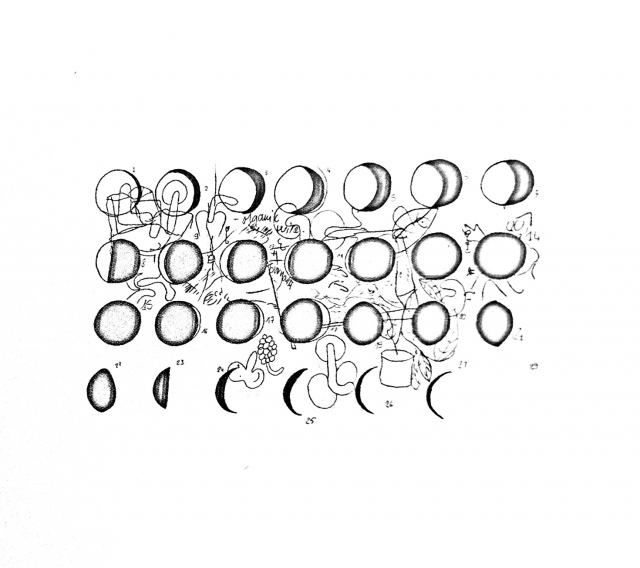
Partager